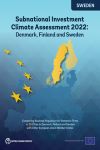Overview
Subnational Investment Climate Assessment 2022: Denmark, Finland and Sweden assesses the regulatory environment for businesses and its impact on local entrepreneurs in 6 cities in Denmark (Aalborg, Aarhus, Copenhagen, Kolding, Naestved and Odense), 6 cities in Finland (Helsinki, Mariehamn, Oulu, Tampere, Turku and Vaasa) and 8 cities in Sweden (Gävle, Göteborg, Jönköping, Malmö, Stockholm, Sundsvall, Umeå and Uppsala). The study measures regulations relevant to five stages in the life of a small to medium-size domestic firm: business start-up, building permits, electricity connection and supply, property transfer, and commercial litigation. In each of these areas, the study highlights good practices that can be leveraged to empower local entrepreneurs and firms.
Doing Business in the European Union is a series of subnational studies requested and funded by the European Commission, Directorate-General for Regional and Urban Policy, and produced by the World Bank Group. Previous editions, covering cities from Austria, Belgium, Bulgaria, Croatia, the Czech Republic, Greece, Hungary, Ireland, Italy, the Netherlands, Portugal, Romania, and Slovakia, were released in 2017-2021.
Where is it easier to do business in Sweden?
Main findings
- The Swedish business environment is relatively homogenous across locations, despite subnational differences in three areas. Of the 16 EU member states assessed by this series, Sweden has one of the most homogeneous business environments across locations. Swedish cities have the second-smallest gap between the city with the lowest score and the city with the highest score across the five regulatory areas benchmarked.
- Where there is variation among locations, smaller cities in Sweden tend to perform better. This is the case when it comes to building permits, electricity connection and supply, and commercial litigation.
- Swedish cities outperform the EU average on most indicators, yet they lag behind the top EU performers. All Swedish cities outscore the EU average in every area but business start-up, but they have room for improvement to achieve best practices in the European Union. The property transfer area is where the gap between the Swedish cities' performance and the best practice in the EU is narrowest.
- Differences in time and cost drive the variations among Swedish cities in building permits, electricity connection, and commercial litigation. The most notable differences are related to the electricity indicator. Getting a commercial electricity connection takes almost two months in Gävle and four months in Stockholm, while the cost to obtain a new electricity connection varies from 25.6% of income per capita in Jönköping to more than four times higher in Stockholm (111.5%).
- Overall, Umeå and Sundsvall have the fastest turnaround times and are the least expensive cities across the five regulatory areas benchmarked. Aggregating the total time and cost to comply with regulations in all five categories studied reveals that it takes entrepreneurs in Uppsala more than three months longer than their peers in Umeå to comply with bureaucratic requirements, and the cost of compliance in Sundsvall is about one-fourth less than in Stockholm.

